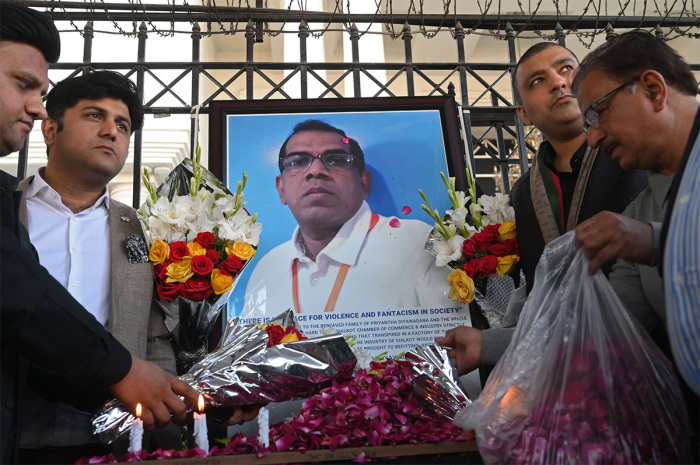Pakistan: Islamist mob tortures to death, burns body of Sri Lankan man over alleged ‘blasphemy’

A mob in Pakistan’s Punjab province beat to death a Sri Lankan man and burned his body over allegations of blasphemy.
Video clips shared on social media showed a mob, allegedly supporters of an Islamic party, beating the Sri Lankan, identified as Priyantha Kumara, a manager at a sports equipment factory in Sialkot city, and setting his body ablaze while some men in the mob took selfies with the burning corpse in the background.
“Mr. Kumara allegedly tore a poster of the hardline Tehreek-e-Labbaik Pakistan in which Quranic verses were inscribed and threw it in the dustbin,” an anonymous official was quoted as saying by the Press Trust of India.
“The poster of the Islamist party was pasted on the wall adjoining the office of Kumara. A couple of factory workers saw him removing the poster and spread the word in the factory,” the official said, adding that most of the people in the mob were activists and supporters of the TLP.
“The mob dragged the suspect (the Sri Lankan national) from the factory and severely tortured him. After he succumbed to his wounds, the mob burn[ed] his body before police reached there,” he said.
Police spokesman Khurram Shahzad told reporters Saturday that about 120 people had been arrested.
Pakistani Prime Minister Imran Khan called it a “day of shame for Pakistan.”
“The horrific vigilante attack on factory in Sialkot & the burning alive of Sri Lankan manager is a day of shame for Pakistan,” he tweeted. “I am overseeing the investigations & let there be no mistake all those responsible will be punished with full severity of the law. Arrests are in progress.”
Nasir Saeed of the United Kingdom-based Centre for Legal Aid Assistance and Settlement blamed the government’s “inaction” on previous cases of mob violence and the blasphemy laws.
“Neither is this the first case of public lynching nor is it going to be the last unless the government and politicians take this matter seriously and make appropriate changes to the law,” Saeed said in a statement, calling the incident one of the “worst examples of how people are misusing the blasphemy law.”
“This year alone more than a dozen people have been charged under the blasphemy law and attempts were made to kill the majority of them,” he added. “But those who attempted to take their lives were never asked questions even after they admitted their crimes, while they should have been arrested for taking the law into their own hands.”
The blasphemy law, embedded in Sections 295 and 298 of the Pakistan Penal Code, is frequently misused for personal revenge. It carries no provision to punish a false accuser or a false witness of blasphemy.
The law is also used by Islamist extremists to target religious minorities — Christians, Shi’as, Ahmadiyyas and Hindus.
The world’s attention was drawn to Pakistan’s blasphemy law after Christian mother of five Asia Bibi was sentenced to death and served over 10 years in prison before Pakistan’s Supreme Court acquitted her in 2018. Her acquittal drew the ire of radical extremist groups as many protested in the streets and threatened to kill the Supreme Court judges responsible.
In 2014, Christian couple Shehzad and Shamah Masih were burned to death in a brick kiln over false accusations they ripped pages from the Quran.




























